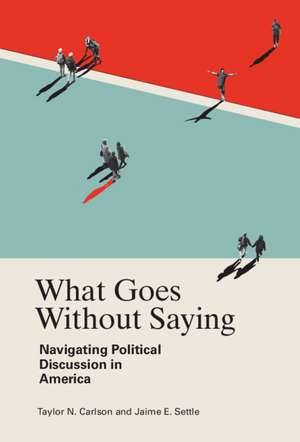What Goes Without Saying: Navigating Political Discussion in America
Autor Taylor N. Carlson, Jaime E. Settleen Limba Engleză Paperback – 8 iun 2022
| Toate formatele și edițiile | Preț | Express |
|---|---|---|
| Paperback (1) | 206.18 lei 6-8 săpt. | |
| Cambridge University Press – 8 iun 2022 | 206.18 lei 6-8 săpt. | |
| Hardback (1) | 529.42 lei 6-8 săpt. | |
| Cambridge University Press – 8 iun 2022 | 529.42 lei 6-8 săpt. |
Preț: 206.18 lei
Nou
Puncte Express: 309
Preț estimativ în valută:
39.45€ • 41.30$ • 32.84£
39.45€ • 41.30$ • 32.84£
Carte tipărită la comandă
Livrare economică 31 martie-14 aprilie
Preluare comenzi: 021 569.72.76
Specificații
ISBN-13: 9781108927444
ISBN-10: 1108927440
Pagini: 300
Dimensiuni: 151 x 229 x 17 mm
Greutate: 0.43 kg
Ediția:Nouă
Editura: Cambridge University Press
Colecția Cambridge University Press
Locul publicării:New York, United States
ISBN-10: 1108927440
Pagini: 300
Dimensiuni: 151 x 229 x 17 mm
Greutate: 0.43 kg
Ediția:Nouă
Editura: Cambridge University Press
Colecția Cambridge University Press
Locul publicării:New York, United States
Cuprins
1. Opening the black box of political discussion; 2. The 4d framework of political discussion; 3. Data collection; 4. Detection: Mapping the political landscape (stage 1); 5. Decision: To talk or not to talk? (stage 2); 6. Discussion: The psychophysiological experience of political discussion (stage 3); 7. [further] discussion: Expression in political discussion (stage 3); 8. Determination: When discussion divides us (stage 4); 9. Individual dispositions and the 4d framework; 10. The costs of conversation; Index.
Recenzii
'The nature of democratic discourse is one of the most studied topics in the social sciences – and for good reason since it plays a large role in determining how democracies function. Yet, existing work has almost completely ignored the fundamental question of why people talk about politics in the first place. The authors make a seminal contribution by detailing the processes that drive political discussions or lack thereof. Their framework, which accentuates how social processes shape political interactions, will guide thinking for generations to come.' James N. Druckman, Payson S. Wild Professor of Political Science and Faculty Fellow at the Institute for Policy Research, Northwestern University
'Carlson and Settle bring together several strands of research that have been percolating over the past decade or so; then, they advance our state of understanding by bringing these strands into conversation with one another. With their 4D Framework, a more coherent and ultimately useful perspective on informal political discussion has emerged. These insights highlight new questions and directions for research and raise a cautionary note about broad and undifferentiated calls for more talk as a salve for American democracy.' William P. 'Chip' Eveland Jr., Professor of Communication, The Ohio State University
'Carlson and Settle brilliantly situate political discussion in the context where it actually happens - which is often the places where it is neither expected nor desired. The authors carefully weave classic theories of interpersonal conflict with novel insights about how both group dynamics and individual traits shape the unanticipated origins and often uncomfortable impact of every-day political chit-chat. Using cutting-edge techniques, these authors provide the clearest picture to date on the strain that political discussions pose on the public and the rationale behind America's trepidation toward talking about politics.' Samara Klar, The University of Arizona, co-author of Independent Politics
'Carlson and Settle provide the most comprehensive framework for understanding political discussion. Their framework integrates insights from neuroscience, network science, and many other disciplines. They show the value of this framework using innovative survey research paired with biometric feedback and creative experimental designs.' Matthew T. Pietryka, Florida State University, co-author of Examining Motivations in Interpersonal Communication Experiments
'Carlson and Settle bring together several strands of research that have been percolating over the past decade or so; then, they advance our state of understanding by bringing these strands into conversation with one another. With their 4D Framework, a more coherent and ultimately useful perspective on informal political discussion has emerged. These insights highlight new questions and directions for research and raise a cautionary note about broad and undifferentiated calls for more talk as a salve for American democracy.' William P. 'Chip' Eveland Jr., Professor of Communication, The Ohio State University
'Carlson and Settle brilliantly situate political discussion in the context where it actually happens - which is often the places where it is neither expected nor desired. The authors carefully weave classic theories of interpersonal conflict with novel insights about how both group dynamics and individual traits shape the unanticipated origins and often uncomfortable impact of every-day political chit-chat. Using cutting-edge techniques, these authors provide the clearest picture to date on the strain that political discussions pose on the public and the rationale behind America's trepidation toward talking about politics.' Samara Klar, The University of Arizona, co-author of Independent Politics
'Carlson and Settle provide the most comprehensive framework for understanding political discussion. Their framework integrates insights from neuroscience, network science, and many other disciplines. They show the value of this framework using innovative survey research paired with biometric feedback and creative experimental designs.' Matthew T. Pietryka, Florida State University, co-author of Examining Motivations in Interpersonal Communication Experiments
Notă biografică
Descriere
This book examines how the psychosocial motivations underpinning political discussion present dire challenges to meaningful political conversations across lines of difference.
